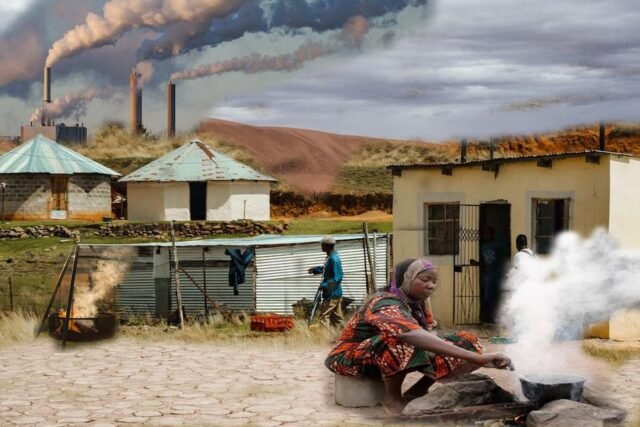Air pollution in Nigeria is a pressing issue that threatens the health and well-being of its citizens. Not only does it affect outdoor air quality, but indoor air pollution also poses a significant risk. The burning of solid fuels for cooking and heating is a major contributor to indoor air pollution and is responsible for more deaths in Nigeria than outdoor sources. According to a 2018 World Health Organization (WHO) report, indoor air pollution caused over 4,000 deaths per year, while outdoor air pollution was estimated to cause around 3,000 deaths annually. This highlights the urgent need for action to address the problem of air pollution in Nigeria and promote sustainable development. By exploring the causes and effects of air pollution, we can work towards finding solutions that improve air quality and hold the government accountable for their role in tackling this issue. Specifically, this article will focus on indoor air pollution, as it poses the greatest challenges.
Air pollution & Waste Disposal
Air pollution has become a major concern in Nigeria, with the indiscriminate burning of waste being one of the primary causes. For the purpose of this paper Indiscriminate waste burning can be considered a source of indoor air pollution in Nigeria, as well as outdoor air pollution. Burning waste releases various pollutants, including particulate matter, carbon monoxide, and toxic chemicals, into the air. These pollutants can have negative impacts on human health, particularly for people who are exposed to them regularly, such as those living or working near waste burning sites or those living in houses or areas where wastes are burnt regularly (World Health Organization, 2020).
This practice, which is often done by individuals and businesses in an effort to dispose of waste quickly and cheaply, has led to a wide range of negative effects on the environment and human health.
One of the main issues with the indiscriminate burning of waste in Nigeria is the release of harmful pollutants into the air. These pollutants include particulate matter, carbon monoxide, and other toxic chemicals that can have a significant impact on the environment and human health. Particulate matter, for example, can cause respiratory problems and aggravate existing conditions such as asthma and chronic obstructive pulmonary disease (COPD). Carbon monoxide, on the other hand, can lead to headaches, dizziness, and even death in severe cases.
Another major concern with the indiscriminate burning of waste in Nigeria is the damage it causes to the environment. The release of pollutants into the air can have a devastating impact on local ecosystems, particularly on wildlife and plant life. In addition, the burning of waste can lead to the release of greenhouse gases, which contribute to global warming and climate change.
The indiscriminate burning of waste also has a significant impact on human health. The toxic pollutants released into the air can cause a wide range of health problems, including respiratory issues, heart disease, and cancer. Children and the elderly are particularly at risk, as they are more vulnerable to the effects of air pollution.
Despite the well-known negative effects of the indiscriminate burning of waste in Nigeria, the practice continues to be a widespread problem. One of the main reasons for this is the lack of proper waste management infrastructure in the country. Many areas of Nigeria do not have access to proper waste disposal facilities, making it difficult for individuals and businesses to dispose of their waste in an environmentally-friendly manner.
In addition, there is a lack of public awareness and education about the dangers of the indiscriminate burning of waste. Many people are not aware of the negative effects of this practice on the environment and human health, and as a result, continue to engage in it.
To address the problem of the indiscriminate burning of waste in Nigeria, a number of solutions have been proposed. One of the most important is the development of proper waste management infrastructure. This includes the construction of more waste disposal facilities and the development of more efficient waste collection and transportation systems.
Another important solution is the implementation of stricter regulations and laws to prevent the indiscriminate burning of waste. This includes penalties for individuals and businesses that engage in this practice, as well as increased enforcement efforts to ensure compliance with these laws.
In addition, public awareness and education campaigns are crucial in addressing the problem of the indiscriminate burning of waste in Nigeria. These campaigns can help to raise awareness of the negative effects of this practice on the environment and human health, and encourage people to adopt more environmentally-friendly waste disposal practices.
Finally, the Nigerian government should invest more in research and focus on the development of alternative waste management methods. This will help to find new, sustainable solutions for waste disposal in the country, and also encourage other countries to invest in similar projects.
AIR POLLUTION & THE POPULAR COOKING FUEL
Air pollution is a serious problem in Nigeria, and one of the major sources of this pollution is the use of cooking fuels that pollute the environment. These fuels include charcoal, firewood, and kerosene, which are commonly used by households and small businesses across the country. Despite efforts to reduce the use of these fuels and promote cleaner alternatives. The problem persists, causing significant harm to the health and well-being of the Nigerian population.
One of the main reasons for the widespread use of polluting cooking fuels in Nigeria is the lack of access to electricity. According to data from the World Bank, as of 2021, only about 40% of the Nigerian population has access to electricity, and many of those who do have access experience frequent power outages. As a result, many households and small businesses rely on charcoal, firewood, and kerosene as their primary source of energy for cooking and heating.
Another reason for the widespread use of these fuels is the relatively low cost. Charcoal, firewood, and kerosene are widely available and affordable for many households and small businesses, making them a more accessible option than cleaner alternatives such as liquefied petroleum gas (LPG) or electricity.
The use of polluting cooking fuels has a significant impact on the health of the Nigerian population. According to data from the World Health Organization (WHO), exposure to fine particulate matter (PM2.5) from the use of these fuels is a leading cause of premature death in the country. PM2.5 is a type of air pollution that can penetrate deep into the lungs, causing respiratory and cardiovascular problems, as well as cancer … effecting primarily women and children who are exposed on a daily basis.
In addition to the health impacts, the use of polluting cooking fuels also contributes to environmental degradation. Deforestation, for example, is a major issue in Nigeria due to the high demand for firewood and charcoal. This not only destroys natural habitats for animals and plants, but also contributes to climate change by releasing carbon dioxide into the atmosphere.
Efforts have been made to reduce the use of polluting cooking fuels in Nigeria and promote cleaner alternatives. One of the main initiatives is the National Clean Cooking Fuel Policy, which was launched in 2018 by the Nigerian government. The policy aims to increase access to cleaner cooking fuels, such as LPG, and to phase out the use of polluting fuels.
The government has also established programs to provide financial support for households and small businesses to transition to cleaner cooking fuels. For example, the Nigerian National Petroleum Corporation (NNPC) has a program that provides subsidies for the purchase of LPG cylinders and stoves. Additionally, some NGOs and private organizations have launched programs to promote the use of cleaner cooking fuels and educate households and small businesses about the benefits of switching.
Despite these efforts, the adoption of cleaner cooking fuels in Nigeria has been slow. According to data from the NNPC, only about 2% of households in Nigeria use LPG for cooking, and the majority of households still rely on charcoal, firewood, and kerosene. This is due in part to the high cost of LPG, as well as a lack of awareness and education about the benefits of cleaner cooking fuels.
CONCLUSION
The indiscriminate burning of waste and polluting fuels to cook in Nigeria is a major contributor to the country’s air pollution problem. To address this issue, it is important to promote the use of cleaner and more efficient cooking fuels, promote waste management practices that reduce the amount of waste that is burned; and increase awareness and education about the negative effects of air pollution. The Nigerian government should also invest in monitoring and enforcement programs to ensure that companies and individuals are complying with regulations and laws related to air pollution. With concerted efforts and commitment, we can achieve a cleaner and healthier environment in Nigeria.
References
World Health Organization (WHO). (2018). Global Health Observatory (GHO) data. Indoor and Outdoor Air pollution. Retrieved from: https://www.who.int/gho/publications/world_health_statistics/EN_WHS2018_Full.pdf?ua=1
World Health Organization (WHO). (2020). Air pollution and health. Retrieved from https://www.who.int/airpollution/ambient/health-impacts/en/





































